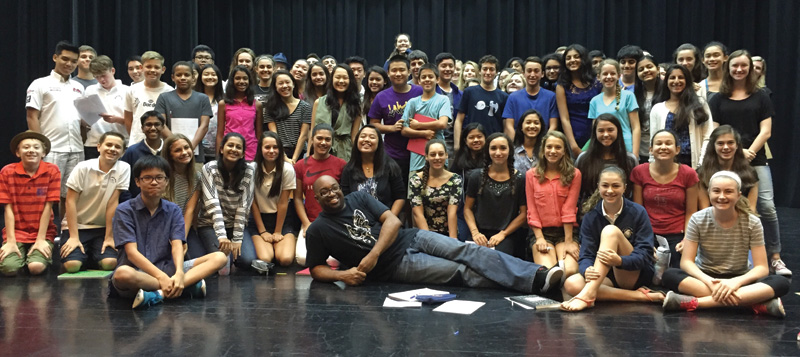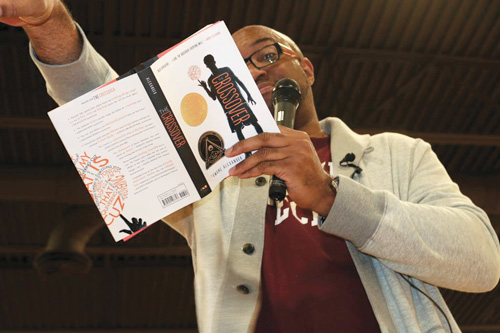How Kwame Alexander Gets Teens Reading and Writing Poetry

Kwame Alexander (front) with students from the Singapore American School.
Photo by thatcameraguysg@yahoo.com/courtesy of Singapore American School.
“When I go to high schools the thing I tell the young men is you start writing poetry and you will always win. Write poems and learn how to slow dance.” —Sherman Alexie
The world is hungry for words of hope, change, humor, and love, and the writing workshop has the ability to conjure up the kind of meaningful and creative energy that we all crave. The writing workshop is a gathering of passionate ideas and opinions. It is the birthplace of creative inspiration and illumination.
It is the room where our students can go to imagine and re-imagine the world for themselves, and for us. Even the most reluctant and recalcitrant of literary learners can be empowered. Want to create an immediate, vibrant, powerful writing workshop? Try poetry.
I have a guiding belief in the power of poetry to connect with young writers in transformative and profound ways. Poet and writer Georgia Heard suggests that we use poems as transitions, immersing students in accessible poems first and then building on that foundation. I couldn’t agree more.
Now, I know that teaching poetry, in many of our minds, is akin to a nonswimmer diving into the deep end, blindfolded. I also know that teaching poetry is often a balancing act between the technical aspects of form and the creative aspects of writing, and that reciting rules and stressing form can stifle creativity or turn students (and teachers) off of poetry. So, I’ve devised a method that guarantees your students will get on board. It’s worked for me in high schools and summer teen programs, in Virginia and Singapore, in libraries and juvenile detention facilities. The truth is, we all know how to swim; we’ve just forgotten how much we like it. This is a friendly reminder.
Want to get your students excited about poetry? Try love.
Crush
The librarian’s name was Kathy Allen. She’d invited me to speak to the juniors and seniors in her Chesapeake (VA) high school. Up until that point, I’d mainly facilitated performances and workshops for small groups in very intimate settings. And that’s what I expected of this school visit. I was wrong.
At 8:00 a.m., Kathy ushers me into a state-of-the-art theater with proscenium stage, fantastic acoustics and lighting, stadium seating, and 400 cushiony seats filled with half-awake students. She introduces me, and I walk out on stage to feint applause. The spotlight is dead on me, so I can’t see any of the sleeping students. I can’t see the principal and the local public librarian who’ve come to see my “performance.” I can’t even make out my parents, who are in the audience. The only thing I can see is my certain failure. It envelopes me, seals me in a shroud of fear and anxiety. This will be my last time presenting in a theater, I think. Five seconds of silence seems like five minutes. Or five hours.
I reach into the back pocket of my Levi’s jeans and pull out the poetry book I’d planned on giving away after the presentation. I fumble through the pages, and decide on a short (hopefully) funny poem of mine to read that just may wake a few kids up.
lips like yours ought to be worshippe see, i ain’t never been too religious but you can baptize me anytime
There is silence at first. And then the place erupts. A kid in the front row is jolted out of his nap by the raucous OOOOHS and AHHHS. Guys are high fiving each other. Even my dad is laughing. So, I read another one.
I am not a painter Browns and blues We get along But we are not close I am no Van Gogh But give me Plain paper A dull pencil And I will Hijack your curves Take your soul Hostage Paint a portrait So colorful and delicate You just may have to Cut off my ear
Half the room explodes in laughter. All the adults get it, and I see a girl explaining to her boyfriend “It’s van Gogh, the painter who cut off his ear.” And all of a sudden we’ve got an excited, engaged audience of high school students begging for more poetry. For more love poems. So I reach back in my pocket and spend the next 45 minutes reading and discussing love poems. The kids are spellbound. They are on the edge of their seats. They. Are. Awake.
Poem in your pocket
Leading a writing workshop? Teaching a poetry unit? Want your high school students to get excited about reading Shakespeare’s love sonnets? Start. Class. With. A. Love. Poem. An accessible one. A relatable one. A poem that you like. Even better, a poem that you love. Read it, recite it, play it, show it, let your students perform it. Perhaps it might be e.e. cummings “i carry your heart with me.” (Let students mimic the style of this poem, and write their own. Teach them the rules, of course, then let them break them, just like cummings does so well. The results are interesting, magical, and often hilarious.) Listen to Madonna reciting Pablo Neruda’s poem “If You Forget Me.” If you’re really good, you might pull out a poem you wrote in high school, or one you shared at the open mic no one knows you attended. If students see you taking a risk, being vulnerable (what is more vulnerable and interesting than LOVE), they will be more willing to do the same.
Pocket poetry books for your students (and you)
Bronx Masquerade by Nikki Grimes (Dial, 2001) Brown Girl Dreaming by Jacqueline Woodson (Penguin, 2014) Crush: Love Poems for Teenagers by Kwame Alexander (Word of Mouth, 2007) Partly Cloudy: Poems of Love and Longing by Gary Soto (Harcourt, 2009) Street Love by Walter Dean Myers (HarperCollins, 2006) The Way a Door Closes by Hope Anita Smith (Holt, 2003) We Go Together!: A Curious Selection of Affectionate Verse by Calef Brown (HMH, 2013)
“Chasing the Wind”
My heart b i l l o w s with the breeze Dithering like any other wind-borne object Often caught tangled in your branches I’m a leaf that can’t escape the tree’s intricate lace Sallow bark, skeletal limbs Your season has come and gone But I, a perennial, have remained I run to catch you but you effortlessly waver by And as I hold out my hand to grasp you Your hollow, transparent body
s l i p s
through my fingertips —Lauren, 11th grader
“the beauty of you”
Your beauty grazes the morning skies. Flowers of them all follow your radiant path. All bask in your red, orange, yellow dyes. All bask in your gracious smile and laugh. All bask in your kind heart, never sighting wrath. Your heart is cleaner and more pure than a bath. Your beauty stands, straight, and untouched. Because of this, you forgive the shade. Warmth and day for which you have clutched. Your carpe diem will never fade. For you can never be weighed. You sparkle more than of diamond and jade. —Ty, 12th grader
(There are three more stanzas of Ty’s poem, but trust me, you wouldn’t be able to handle it. He had me at “more pure than a bath.” Oh my!)
What’s more, poetry addresses the demands of higher standards. Need to help your students determine the theme of a story? Try poetry. Nudging your students to wrap their writing heads around compare and contrast? Poetry is your best friend. What about word study and understanding the value of thoughtful word choice? You simply can’t beat poetry for pure turbocharged “skill work.” The student work above showcases the important role poetry can play in meeting the standards:
• How an idea develops over the course of a text • Uses of connotative and figurative language • Establishment of theme • Use of inferences • How word choice shapes a text • How point of view shapes a text • How two texts address the same theme
Teenagers are already navigating their way through crushes, first dates, breakups, and heartbreak, so why not capitalize on that, use it as a way to tap into their emotional intelligences, much like Shakespeare has tapped into ours, so cleanly and succinctly. I mean, who among us does not want to be loved eternally?
Shall I compare thee to a summer’s day? Thou art more lovely and more temperate:

Photo by thatcameraguysg@yahoo.com/
courtesy of Singapore American School.
Choosing vivid love poems, full of metaphor and message, is a surefire way to make strong reading-writing connections with your students. (And sharing humorous love poems is a great way to keep the attention of 400 students at a morning assembly).
“It’s not that I don’t love you,” she says. Indeed I do. I simply want to lasso your lips, tame them, ride and rein them into my stable, but first my love, you must agree to commit…to a breath mint.
Crush revisited
Following the presentation in the theater, I led a smaller, more intimate writing workshop in Kathy Allen’s library. We discussed the merits and meaning of some of my poems, which got students intimately invested in poetry and, inevitably, their own writing.
How I wish I still had some of their writings from that day. They weren’t masterpieces by any stretch of the imagination, but they were stepping stones. They were ladders to more writing. To greater writing. They were confidence boosters. They were cool glasses of fresh limeade on a steamy summer day. And it is that kind of comfort and heart that must be summoned at the beginning of any successful writing workshop.
At the end of my school visit, a young lady came over, began asking a plethora of questions, and recited one of her love poems to me. We hugged, and she gave me the poem (later, Kathy would tell me that she had barely talked all year, and that this was the most alive she’d ever seen her). Next, a crew of boys came over, waving cash in the air and asking if they could buy copies of my poems. After much laughter, I sold them each a book, and they left reading poems to each other. One kid even put the book in his back pocket, like I did, and I think the whole lot of us were changed that day.
Want to get your high school students reading and writing poetry? Start. Class. With. A. Love. Poem. My favorite is “Oranges” by Gary Soto. It’s all about young love and coming-of-age, themes that every teenager can relate to.
What’s in your pocket?
 Kwame Alexander is a poet, educator, and author of The Crossover (HMH, 2014) and the forthcoming novel-in-verse Booked (HMH, 2016). Parts of this article are excerpted from the forthcoming Kwame Alexander’s Page to Stage Writing Workshop (Scholastic Professional).
Kwame Alexander is a poet, educator, and author of The Crossover (HMH, 2014) and the forthcoming novel-in-verse Booked (HMH, 2016). Parts of this article are excerpted from the forthcoming Kwame Alexander’s Page to Stage Writing Workshop (Scholastic Professional).
Kwame Alexander poems from And Then You Know: New & Selected Poems by Kwame Alexander (Create Space, 2012). Student poems used with permission from Kwame Alexander’s Page to Stage (Scholastic Professional, 2015).
RELATED
The job outlook in 2030: Librarians will be in demand
The job outlook in 2030: Librarians will be in demand
ALREADY A SUBSCRIBER? LOG IN
We are currently offering this content for free. Sign up now to activate your personal profile, where you can save articles for future viewing






Add Comment :-
Be the first reader to comment.
Comment Policy:
Comment should not be empty !!!